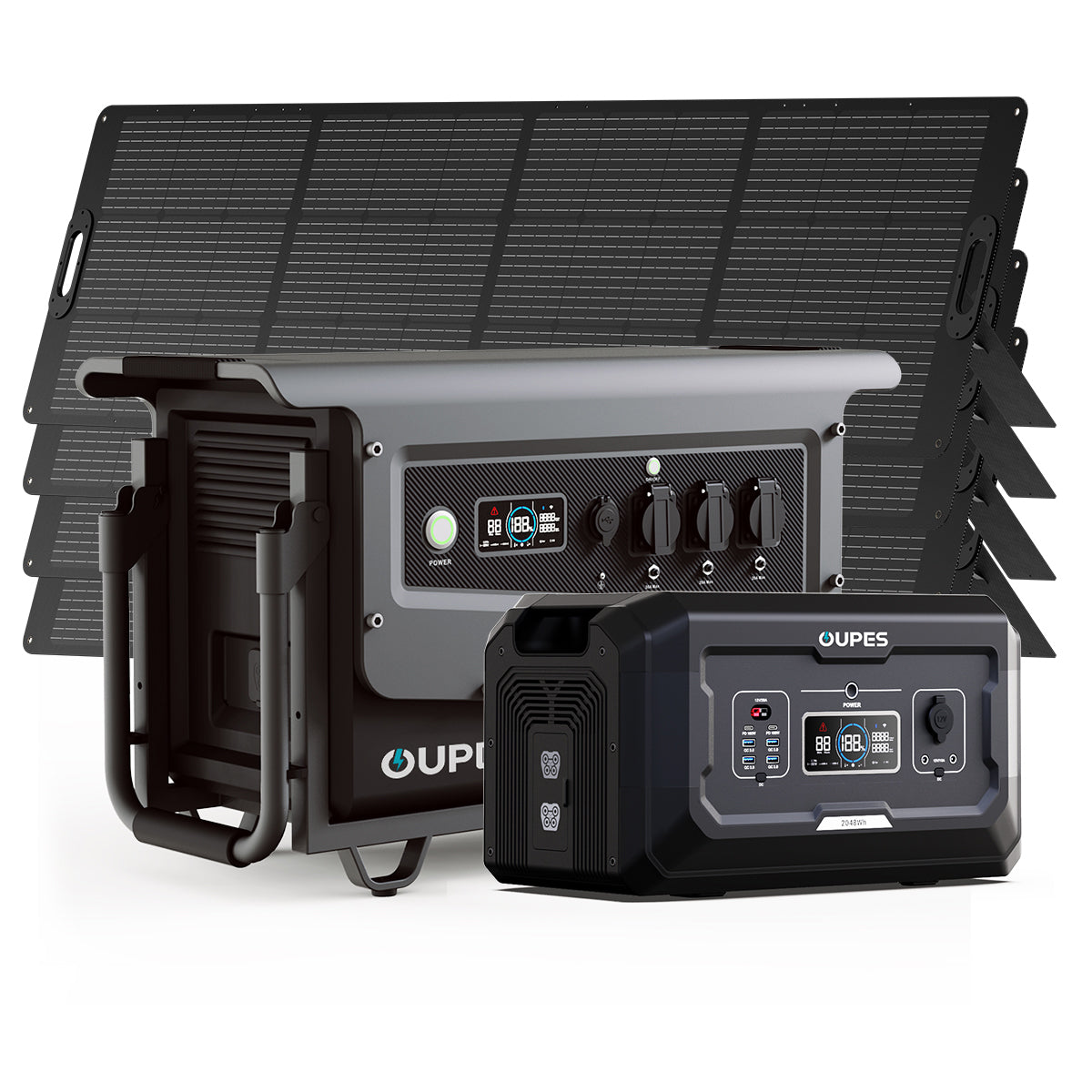
🌥️ Do Solar Panels Work on Cloudy Days? Understanding Solar Performance in All Weather
When people think of solar panels, they usually imagine clear blue skies and direct sunshine. But what happens when the weather turns cloudy? The good news is: solar panels do work on overcast days—just with reduced efficiency. Thanks to modern advancements in solar technology, your system can still generate and store power in less-than-perfect conditions.
If you’re considering investing in solar panels or already using a solar generator, it’s essential to understand how your system performs during cloudy weather. In this guide, we’ll break down the science, performance factors, and how OUPES solar generators can help you stay powered—rain or shine.
☁️ How Solar Panels Generate Power on Cloudy Days
Solar panels use photovoltaic (PV) cells to convert sunlight into electricity. While they perform best under direct sunlight, PV cells can also absorb diffuse sunlight—sunlight scattered by clouds, fog, or haze.
On a cloudy day, your solar panels may still produce 10–25% of their maximum output, depending on the density of cloud cover and the quality of your panels. High-efficiency solar panels are specifically designed to optimize energy production in low-light conditions, helping you maintain a steady flow of power even when the skies are gray.
Pairing solar panels with a power station like the OUPES Mega 3 (3600W output / 3072Wh capacity) allows you to store every bit of generated energy—making it available when you need it most, including during cloudy afternoons or overnight.
🔍 Factors That Impact Solar Efficiency on Cloudy Days
🧪 1. Panel Type and Efficiency
-
Monocrystalline panels outperform polycrystalline in low-light scenarios.
-
Investing in premium solar panels ensures better overall performance.
🌡️ 2. Temperature
Contrary to popular belief, solar panels operate more efficiently in cooler temperatures. On overcast days with moderate temps, reduced sunlight may be balanced out by cooler conditions.
🔋 3. Energy Storage Capacity
Having a high-capacity portable power station is critical to storing excess energy for later use. For example, the OUPES Mega 5 (4000W / 5040Wh) ensures you have backup power during multiple cloudy days in a row.
🌍 4. Location and Season
Areas with frequent cloud cover or shorter daylight hours in winter will see seasonal reductions in output. However, efficient power stations and smart solar system design can bridge the gap effectively.
⚡ Benefits of Solar Generators in Cloudy Weather
Even with reduced sunlight, solar generators provide serious advantages:
🔋 1. Energy Storage for Continuous Power
Solar generators capture and store energy during peak sunlight hours for use when sunlight is limited—especially vital during power outages or emergency use.
-
Example: The OUPES Titan 5 (5040Wh capacity, 4000W output) is perfect for long-term reliability, storing enough energy to run essential home devices for hours—even on gray days.
🌱 2. Zero Emissions, Quiet Operation
Unlike gas-powered generators, solar units run clean and quiet—making them a greener and safer solution, particularly for residential or indoor use.
🏕️ 3. Portability and Versatility
Whether you’re camping, tailgating, or facing a blackout, a solar generator gives you off-grid power anytime, anywhere. Lightweight options like the OUPES Exodus 600 Plus are ideal for portable power needs.
🔧 How to Maximize Solar Performance on Cloudy Days
Here are a few best practices to get the most from your solar system—rain or shine:
✅ 1. Keep Panels Clean
Dust, debris, or snow can block sunlight. Regular cleaning helps maintain peak performance.
✅ 2. Use High-Efficiency Panels & Power Stations
The OUPES Mega 2 (2500W / 2048Wh) is designed for optimized charging and energy delivery—even in low-sun conditions.
✅ 3. Invest in Solar Trackers
Solar trackers automatically adjust panel angles to follow the sun’s movement—maximizing exposure even in overcast conditions.
✅ 4. Adopt Smart Energy Habits
-
Schedule high-energy tasks during the brightest part of the day.
-
Use energy-efficient appliances to extend your stored power.
-
Avoid unnecessary power drains when solar production is low.
🧭 Reliable Solar Power—Whatever the Weather
Cloudy skies don’t mean powerless days. With the right setup—including efficient solar panels, high-capacity energy storage, and smart system design—you can rely on solar power all year long.
🔋 OUPES Offers Trusted, Scalable Power Solutions:
| Model | Output / Capacity | Best Use |
|---|---|---|
| Exodus 600 Plus | 600W / 512Wh | Lightweight, portable for on-the-go charging |
| Mega 2 | 2500W / 2048Wh | Daily use, smaller homes, backup essentials |
| Mega 3 | 3600W / 3072Wh | Reliable backup for homes or off-grid adventures |
| Mega 5 | 4000W / 5040Wh | Long-term home backup, cloud-heavy regions |
| Titan 5 | 4000W / 5040Wh | Powerful, long-duration use in all conditions |
✅ Conclusion: Power Through Any Weather with OUPES
While solar panels produce less electricity on cloudy days, they remain a reliable energy source—especially when paired with efficient power storage systems. Whether you’re looking to power your home, stay connected during emergencies, or travel off-grid, OUPES solar generators offer clean, quiet, and dependable energy year-round.
👉 Explore OUPES solar solutions and take control of your power—rain or shine.




























